Contact Admission
International Collaboration
General Practice MD.
On December 28, 2017, Phan Chau Trinh University (PCTU) was granted permission by the Ministry of Education and Training to offer undergraduate medical education programs, according to Decision No. 5838/QĐ-BGDĐT. The School of Medicine at Phan Chau Trinh University is established as a comprehensive medical campus in the Quang Nam - Da Nang University Village, serving as the primary institution for medical education. The university's dedication is driven by the desire to change the perception, status, and true value of the medical profession in society, and its commitment to providing quality medical education has remained steadfast throughout the existence of the university.
The mission and vision of PCTU are to produce a generation of exemplary doctors who possess both excellent knowledge and clinical skills, research capabilities, professional ethics, and leadership skills. These doctors will serve as the core healthcare professionals of the future.
The goals and training strategy of PCTU's medical program are as follows:
- First and foremost, the aim is to cultivate doctors who possess strong ethics, integrity, genuine compassion for others, and a sense of responsibility. This is the most important aspect, not only for doctors but for everyone.
- Secondly, doctors need to have resilience. Having resilience enables them to face challenges, diseases, and conflicts among individuals.
- Thirdly, doctors must have excellent communication skills to effectively interact with patients and establish trust.
- Fourthly, doctors need to be proficient in teamwork. For example, a surgical case requires coordination among the surgeon, anesthesiologist, assistant surgeon, nurses, and other healthcare professionals. Doctors rarely work in isolation, so they need to have teamwork skills to collaborate effectively and achieve the best outcomes.
- Fifthly, doctors should possess leadership or management skills. Some students may wonder why they need to learn leadership skills if they are studying medicine and aiming to become doctors. However, in reality, doctors are leaders of small teams consisting of fellow doctors, nurses, assistants, healthcare staff, and even students who require guidance. Merely acquiring medical knowledge is not sufficient. When they start their careers, they need skills to resolve conflicts and manage others. On a broader scale, doctors may become directors of hospitals, and without proper management skills, the quality of the hospital may suffer. The staff may have to endure an inefficient work environment. Moreover, doctors participate in national and international conferences, head healthcare organizations, and provide advice to the government on healthcare policies. They need leadership skills to effectively lead an organization. Furthermore, doctors in the future may hold leadership positions in the field of healthcare, shaping policies and advising the government on reforms. Therefore, they require advanced leadership skills.
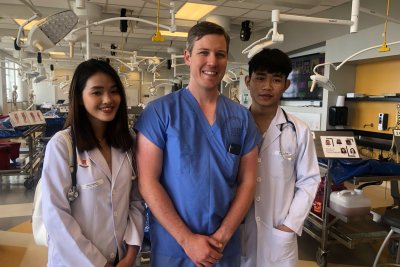
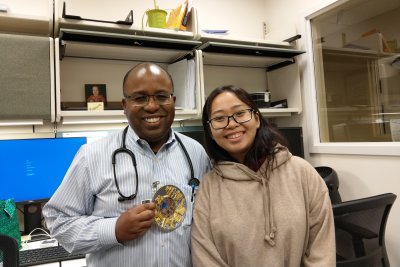
Picture 1: Medical students from PCTU visiting and undergoing training at prestigious medical universities in the United States.
Picture 2: Tran Ngoc Lan Anh, a medical student from the class of 2018-2024, during a training trip in the United States.
In addition, medical students also need to develop their logical thinking, critical thinking skills, time management skills, and task management skills (knowing how to prioritize tasks). They should also gain experience in volunteer work, community engagement, and working in the healthcare field.
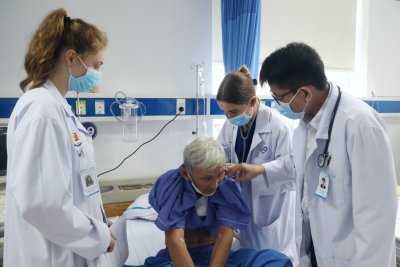
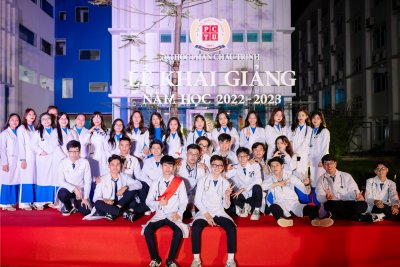
Picture 3: Lecturer guiding two medical students from the University of Manchester during their internship at the university hospital.
Picture 4: Students taking a commemorative photo during the Opening Ceremony of the 2022-2023 academic year.
With the core values mentioned above, we emphasize the importance of various skills such as teamwork, problem identification and solving, communication, leadership, etc. These skills, which were previously given little attention in the training program for general practitioners, are now integrated into the curriculum at Phan Chau Trinh University. Furthermore, due to the global trend, doctors also have to face global health issues, and the demand for medical care for foreign patients is increasing. Therefore, medical students need to be equipped with knowledge about the cultures and customs of different countries. They are also provided with opportunities to participate in internships abroad to broaden their understanding of the world and its people.
Our training philosophy revolves around cultivating the three T: Tam (Attitude), Tri (Knowledge), and Tay nghe (Skills).
Training strategy with 4 pillars:
-
Early and continuous internships: With the existing system of practicing hospitals, students have the opportunity to intern from the first year, and the internship period extends throughout their study. This enables students to access hospitals early, familiarize themselves with medical records for professional learning, interact with patients for care and skill development. The doctors at the hospitals are also the university's lecturers, ensuring consistency in the training program, content, instructional methods, and result evaluation. Each doctor, as a guiding lecturer, supervises a maximum of 5 students. The entire process is monitored and independently evaluated by the Examination and Quality Assurance Center of the university.
-
Modern infrastructure: The university invests in well-equipped practical rooms and laboratories, such as cadaver practice rooms, 2D and 3D anatomy model rooms, pre-clinical skills practice rooms, and laboratory practice rooms. This enhances practical learning opportunities throughout the training program.
-
Integration of scientific research and clinical practice: The university has established the Biomedical Research and Technology Application Center (BMTC) with modern equipment, catering not only to teaching needs but also to research and application of molecular biotechnology to support diagnosis and clinical treatment.
-
Specialized English teaching: Equipping students with a strong English foundation, confidence in communication, and specialized medical terminology enables them to easily access advanced medical knowledge worldwide.
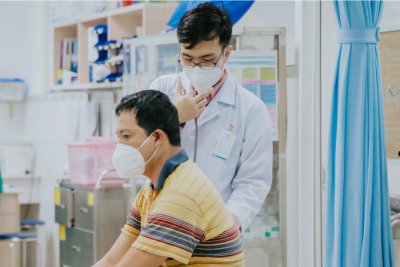
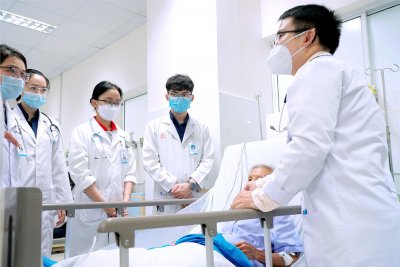
Picture 5: Medical students from PCTU interning at the university's practice hospital from the first year.
Picture 6: Clinical instructor guiding a group of 3-5 students to ensure the quality standards of the university's learning outcomes.
With a dynamic learning environment, a team of specialized lecturers, modern facilities, and innovative teaching methods following international standards, the Faculty of Medicine at Phan Chau Trinh University promises to train generations of doctors who are willing to bring about changes and contribute to the healthcare system of the country.
Graduating students are awarded the degree of DOCTOR, a diploma issued by the MINISTRY OF EDUCATION AND TRAINING, under the Regular Program.
Training Program: Medical
- Major code: 7720101
- Education level: University
- Training system: Regular
- Degree upon graduation: General Practitioner
- Duration of training: 6 years
With the training philosophy of "putting students at the center" to achieve the goal of producing high-quality medical students, competent and compassionate doctors after graduation, capable of clinical practice and medical research, the investment strategy in medical education at Phan Chau Trinh University aims to create a difference.
The training program is a well-integrated combination of the national curriculum framework and the medical training programs of developed countries such as the United States and Australia. This integration allows PCTU medical students to easily access and update their knowledge and keep up with the medical advancements worldwide even during their student years.
The team of professors and medical doctors, both local and international, at PCTU have extensive experience in medical teaching, both in theory and practical clinical experience. They are the main pillar of medical expertise at the university. The faculty members are dedicated to guiding students with their own professional experiences and valuable research work in their medical careers, while the students take an active role in their learning.
Medical students at Phan Chau Trinh University have early access to hospitals from the beginning of their studies, without having to wait for two or three years. This allows students to have a substantial amount of internship time, accounting for 70 to 80% of the 6-year program. This hospital-university structure is a model of medical education adopted by advanced countries for a long time.
The teaching equipment and tools for delivering information and course materials are invested in a way that is suitable for easy access and anytime reference, such as electronic medical libraries, online textbooks, anatomy software, basic medical knowledge, and modern clinical skills.
English is considered a language for teaching and learning, and direct communication in English in the medical field is crucial.
The university values a multicultural and diverse educational environment, ensuring fairness in education and future employment opportunities, allowing graduates to practice medicine in any country. Therefore, PCTU also welcomes international applicants.
At Phan Chau Trinh University of Medicine, the training methods focus on student-centered learning and active participation. Here is a description of the applied teaching methods:
-
Team-based learning (TBL): Students are organized into teams and guided by a faculty member. Instead of passively receiving information from the instructor, students take an active role in the learning process. The instructor provides information, topics, and necessary resources for students to work on. During this process, students can engage in discussions, generate innovative ideas, and the instructor's intervention is limited unless students veer off-topic. This method encourages critical thinking, creativity, and student contribution.
-
Problem-based learning (PBL): In PBL, instructors do not directly provide information but present real-life scenarios or problems. Students are required to independently research information, ask questions, analyze the problem, and find solutions. In this method, the focus is not only on finding the correct answer but also on the learning process, exploration, and problem-solving. PBL is a modern educational approach highly valued by students, as it enhances motivation and improves learning effectiveness.
-
Competency-based learning (CBL): CBL is based on competency standards, where the university provides necessary knowledge blocks. Practical blocks are often implemented parallel to or immediately after the completion of theoretical blocks. This ensures that learning is always coupled with practical application.
Regarding clinical skills training, the university employs simulation methods such as:
-
Mannequin models: Utilizing artificial intelligence in medical education. These models are becoming increasingly advanced, closely resembling real humans, and are pre-programmed with clinical cases. They have the ability to "speak, cry, scream, and experience pain," responding to the "treatments" suggested by students. This allows students to learn how to handle various scenarios on the mannequin models.
-
Standardized patients (SPs): The university hires individuals to portray patients, who are educated in specific medical conditions, and accurately depict symptoms and medical histories for students to interact with. Learning on standardized patients helps students thoroughly prepare clinical skills before practicing on real patients, allowing them to understand medical procedures and visualize a professional working environment such as in a clinic or hospital.
These student-centered and problem-solving approaches, along with simulation-based training, aim to enhance the effectiveness of medical education and prepare students for real-world medical practice.
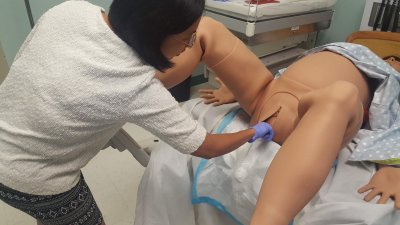
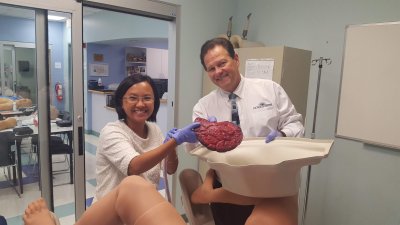
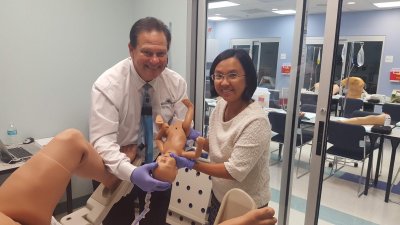
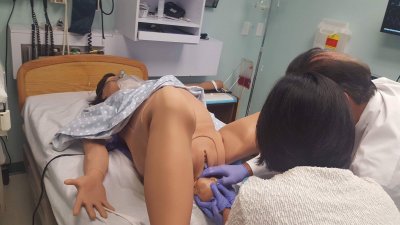
Picture 1: Dr. Linh experienced the childbirth simulation model in the simulation lab of NSU University Hospital.
Regarding practical anatomy learning, in addition to a large cadaver lab, PCTU is implementing the use of 3D software and virtual reality for teaching. The use of 3D imagery is highly effective and enhances students' interest in learning. Some universities have plans to completely replace cadaver-based anatomy education with digital technology. However, there are also opinions that no matter how advanced the technology is, it cannot replace hands-on experience with cadavers. Students still have a better understanding of the human body through practical experience. Therefore, we apply modern technology to supplement traditional teaching methods.
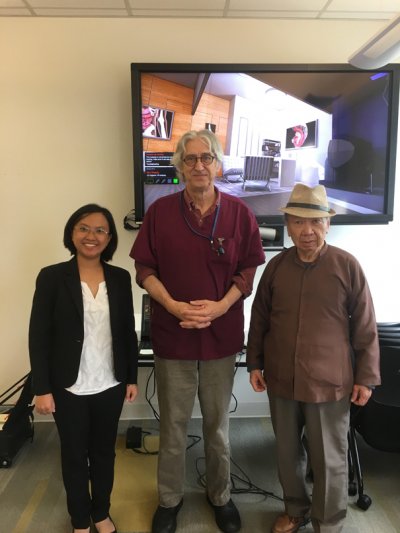
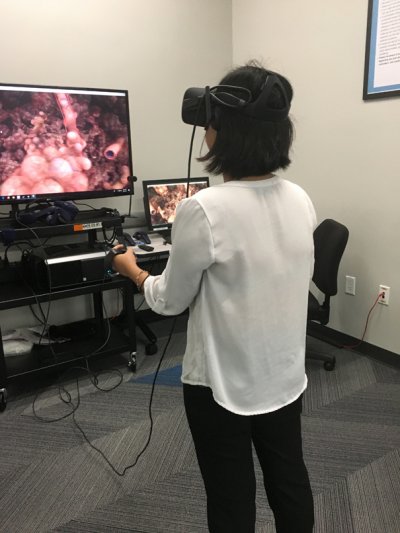
Picture 2: Group photo with Dr. Peter Ohara, Anatomy Professor at UCSF University, California, in the virtual reality anatomy lab.
Picture 3: Dr. Linh experiencing virtual reality anatomy learning method at the library of NSU University, Florida.
Graduates are awarded the degree of DOCTOR, equivalent to the degree issued by the Ministry of Education and Training
In any era, the medical field has always been a prominent and globally recognized area of interest.
Medicine is an applied scientific discipline that encompasses various healthcare methods aimed at maintaining, restoring physical and mental well-being through prevention and treatment. Modern medicine applies scientific knowledge of health, biomedical research, and medical technology to diagnose and treat diseases through medication, surgery, and various other therapeutic approaches.
Although medical technology and specialization have become pillars of modern medicine, direct doctor-patient interaction and treatment methods still prove effective in minimizing patient discomfort. Therefore, these methods need to continue to be implemented by considering the emotional and psychological aspects of human beings.
The PCT Medical program aims to equip students with a solid foundation of knowledge in biology and medicine to address healthcare issues. It ensures that students have access to the latest medical technological advancements worldwide. The program is practical and suitable for the economic, social, and cultural conditions of Vietnam and other countries. It also provides students with professional ethics specific to the medical field.
With specialized knowledge, soft skills, foreign language proficiency, and computer literacy that meet the practical needs of society, PCT medical students can work in high-quality healthcare facilities domestically and internationally, including public and private hospitals, research institutes, and non-governmental organizations. They can also pursue careers as medical lecturers or scientific researchers.
With the university's philosophy, objectives, and training strategies, medical students at Phan Chau Trinh University have great prospects for working in high-quality healthcare facilities both domestically and internationally after graduation. These prospects can be multiplied if students strive to improve their learning during their time as medical students.
There are opportunities for further education and advancement to enhance their qualifications.
After graduation, students have a solid foundation in scientific theory and practical knowledge. They can pursue levels such as Resident Doctor, Primary Specialist Doctor, Secondary Specialist Doctor, Master of Medicine, and Doctor of Medicine.
CONTACT INFO:
Phan Chau Trinh University (University code: DPC)
Campus: 09 Nguyen Gia Thieu St, Ward Dien Ngoc, Dien Ban Town, Quang Nam (University Village of Quang Nam - Da Nang)
Phone: (0235) 3 757 959 - Hotline: 0962553155 - 0981559255
Email: tuyensinh@pctu.edu.vn -Website: www.pctu.edu.vn
Tuition fees of the majors see details here













